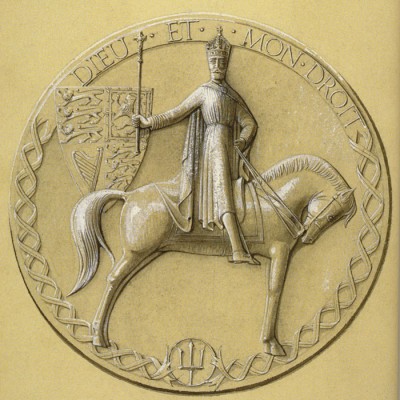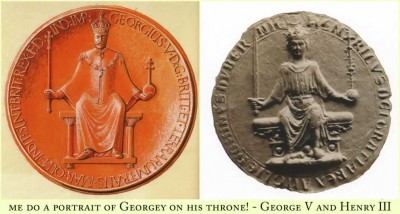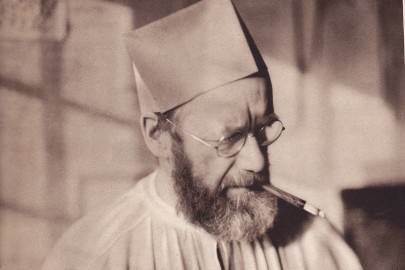The Atlas of Norbiton is a weekly bulletin from Norbiton: Ideal City of the Failed Life. Unlike its more comprehensive, detailed and discursive mother site, the Anatomy of Norbiton – hailed by Nige as “a thing of strange beauty and wonder, inspired by the South London nowhere known as Norbiton” – the Atlas is intended as a pocket guide to the Failed Life for Failed or Failing Individuals on the move.
In 1914 Eric Gill submitted a design – of George V astride a urinating horse – to the Lord Chancellor’s office, intended for the Great Seal of the Realm. It was his third attempt, and it looked like this:
Gill was excited to receive the commission. “Me do a portrait of Georgey on his throne!” he wrote to his friend, the artist William Rothenstein; “Did you ever see the Great Seal of Henry III – 1230? It’s a bloody marvel.’ He had been looking at this and other seals in the British Museum, and his first rejected design was based upon it.
The second design, derived from the Great Seal of Oliver Cromwell of 1655, was also rejected (and not, so far as we know, because of the Cromwell reference). For his third attempt he stood the horse stock still, extended its rigid back legs in a manner typical, it seems, of a urinating horse, and set Georgey upright and preposterous in the stirrups, as though aiding his steed’s micturition.
The design was accepted, though it would presumably have needed the final approval of the King, and someone up the lugubrious chain of State with greater knowledge of the demeanour of horses may in the end have noticed the snook-cocking; but anyway the project stalled with the advent of war, and the seal was never cut.
It is hard to know what to make of Gill, taken all round. His artistic reputation has been if anything enhanced by the revelations in the 1980s of his vast, indiscriminate and, as he himself had it, anti-bourgeois sexual appetites, which included incestuous and abusive relationships with his sister and daughters, and what his biographer describes as an ‘experimental connection’ with his dog. He believed that all art was meaningless unless understood as an expression of religious conviction, and for a period in the 1920s would only work with fellow Catholics.
He was also, unquestionably, one of the great modernist sculptors of the early twentieth century, the finest letter cutter of his day, and a highly original designer of typeface (responsible among other things for the fonts Gill Sans, Joanna and Perpetua). In each of these disciplines he consulted not only his whimsical disposition, or his socialist politics, or his Catholic heterodoxy – the peculiar blend of abilities and dispositions and beliefs that constituted his own originality, in other words – but also picked ceaselessly and perceptively over the great midden of the past, piled up in museums and other collections. Coins and medals and Great Seals, to take only an example, numbered among the scattered remnant, the invaluable spoglia, of vanished or fading cultures and traditions.
The composer Jean Sibelius famously said that music was a mosaic designed by God and thrown down [somewhat petulantly?] in fragments to earth; the job of a composer was to collect it together, sort through it, reassemble it. The composer or artist, conceived of in this way, is a passive and dutiful figure, albeit one alive to the mystical scintillation of his or her work; Gill was conspicuously neither passive nor dutiful, but he might, anyway, have approved the notion that art, and craft, and design, were not the product of a creative imagination ex nihilo, the hair-pulling soul-dredging piano-bashing psychomachia of romantic imagination; but rather the outcome of a lengthy process of discrimination, of assembly, and of (not-overly-respectful) transformation.
I believe that Gill’s small act of sedition has much to teach the nascent republic of Norbiton regarding, among other things, the proper use of medals, seals, stamps and coins, which might otherwise only testify to the malign influence of Emperors, Kings and other despots. Were we in a position to devise our own coinage, say, or cut our own Great Seals (for ritual chucking in the Thames, perhaps), I hope we would somehow manage Gill’s neat trick – part slight of hand, part mental reservation – of precisely respecting and precisely disrespecting in the same laconic gesture.
It anyway amuses me to think that among the tesserae now available for our own recombinations, is one of Georgey’s horse taking a piss. It’s a bloody marvel.












a righteously good read!
My favourite architect (and one of Nige’s I think?) Charles Holden lived in Norbiton, Gill supplied some friezes for Holden’s gothamesque 55 Broadway in St James’s
Well I’m ashamed to say I didn’t know anything about Charles Holden, and yet there he is – Sudbury Town, Arnos Grove, Southgate – and yes, lived in Norbiton until 1902, says Wikipedia. His formative years, makes me proud. The Golden Age too, I shouldn’t wonder. Thks for that
Eric Gill is one of the “Four Absentees” in Rayner Heppenstall’s 1960 memoir of that title. He plays only a peripheral part in this extract, but that’s all the excuse I need to post it here:
“Overhead, there would sound a curious wailing from Father Bernard’s room. When I first heard this sharp cry break out on Monday morning, I had supposed that Father Bernard was either having a fit or whipping himself. [Eric] Gill, however, had quickly reassured me. It appeared that Father Bernard’s vocal cords were not all they might be and that he was studying a new method of voice-production, invented by a man called White, in which the vocal cords were dispensed with altogether and the notes produced by expansion and contraction of the sinuses. This did not seem to me possible.”
It’s perfectly possible. I sometimes wake up doing something similar.
I read that as a young man Ernest George White lost both his singing and speaking voice as a result of poor teaching (mind boggles); he then by devious paths discovered Sinus Tone. in 1933 he founded the Guild of the Voice Beautiful, which by 1940 had over 300 members, and which has, I think mistakenly, renamed itself in his honour.
The technique is briefly summarized as follows:
“Attention is to be centred on a high point in the head and thence tone is to flow downwards, and the more forward the starting point the higher will be the resulting note. With practice this becomes habitual and eventually even simpler, for the voice just rings in the head.”
The voice just rings in the head. Quite so.
It’s all here http://www.egwhitesociety.org.uk/Index.htm#Top
I can’t believe Heppenstall was so quick to scoff.
…and I notice, by the by, that if you’re good enough at it they give you a medal.
Rayner Heppenstall was a great scoffer. Two more samples:
I had never thought highly of Esperanto (my father had once tried to make me learn it, but when I found the word for bird was ‘birdo’ I could no longer take it seriously).
and
A copy of The New English Weekly had come in the post. It contained a long new poem, East Coker, by T S Eliot. I turned to the poem with some eagerness. It began:
In my beginning is my end…
I flung the paper across the room.
Space could be saved in the papers if more reviewers took Heppenstall’s swift and violent approach to judgement.
I eagerly opened Melville’s new novel ‘Moby Dick’. I read the first one-and-a-half words. “Call m-” it said.
I flung the book across the room.
…I eagerly settled down to watch ‘Citizen Kane’. The opening scene showed the sillouette of a gothic mansion.
I flung the television across the room.
Et cetera.
Fascinating stuff. And good to see the noun form of ‘micturate’, an Anthony Burgess favourite that seems to have fallen into complete desuetude since his death.
BTW I’m surprised Malty hasn’t been provoked to comment by the surname ‘Gill’. It’s usually a red rag. This one sounds especially unsavoury.
I believe it shows up in The Big Lebowski.
…’micturate’ that is.
LEBOWSKI: Did I urinate on your rug?
DUDE: You mean, did you personally come and pee on my–
LEBOWSKI: Hello! Do you speak English? Parla usted Inglese? I’ll say it again. Did I urinate on your rug?
DUDE: Well no, like I said, Woo peed on the rug–
LEBOWSKI: Hello! Hello! So every time–I just want to understand this, sir– every time a rug is micturated upon in this fair city, I have to compensate the–
DUDE: Come on, man, I’m not trying to scam anybody here, I’m just-
On a technical point, I had no idea when I wrote this whether standing in the saddle was in fact necessary to aid micturition, but I have now researched the matter (on Jessica Jahiel’s Horse-Sense, the Newsletter of Holistic Horsemanship, where she is answering a question on this very point from Charlene); Jessica says that you should stand ‘as a matter of courtesy to the horse’, not to protect its kidneys (a myth of which I must have been aware at some level). She describes the horse’s posture during urination as ‘rocking-horse’. Evidently the horse feels vulnerable whilst in this catatonia. Georgey could be thus understood as mounting guard, I suppose, like a meerkat – which Jessica Jahiel regards as ‘good practice’.
You’ve reminded me – ‘micturate’ also turned up memorably (and very disgustingly) in dark UK comedy The League of Gentlemen:
HARVEY:
Perhaps you’re a naturally slothful person, sluggish and indolent. A dawdling flaneur, content to waste his life spread-eagled on pillows, forever indulging himself in the pleasures of the palm. I just don’t know…
BENJAMIN:
It’s only a quarter past nine.
HARVEY:
And already a third of the morning is gone, dissolved into the ether!
BENJAMIN:
Yes, but…
HARVEY:
Never mind! Never mind…
VAL:
Well. I don’t know about you, Benjamin, but we like to start the day with a glass of fresh aqua vitae. Would you care to join us?
BENJAMIN:
Yes, mineral water will be fine.
HARVEY CHUCKLES.
HARVEY:
No, no…not mineral water. Aqua vitae…aqua vitae!
VAL:
The water of life!
HARVEY:
It really is the perfect way to set your body up for the day – full of nitrates and enzymes…a natural antibiotic. Auntie Val will fetch you a glass, you can fill it now if you like…
BENJAMIN:
I’m sorry?
HARVEY:
Fill it with your own feculence as we do.
BENJAMIN:
Fill it with my fec –
HARVEY:
Micturate, Benjamin, micturate…pass water.
BENJAMIN:
You want me to piss into a glass?
HARVEY GETS UP AND STANDS BEHIND BENJAMIN.
VAL:
It’s an aid to digestion and so good for the skin!
Yes, that was Mark Gatiss wasn’t it? of Sherlock/Mycroft Holmes fame. I was out of the country when that was on, and never caught up with it.
It’s probably churlish to point out, as we multiply examples, that Gaw was talking about the noun-form of the word, Micturition, but I will because he’d probably like to himself but feels he can’t.
Rare (and excellent) use of the noun-form feculence, by the by…
true, true it was the verb version! mea culpa
Gill’s Seal places Neptune’s Trident neatly “under the ‘orspisses” of the King….
yes, good spot – no end of phallic transferences going on here
The more ‘micturating’ the better as far as I’m concerned. Perhaps we could make it a minor mission of The Dabbler to popularise this largely neglected word in all its forms? We seem well on the way.
A dog called Flaps micturates against a yew tree in “Fruiterer’s Gleam”, a story at Hooting Yard from February last year.
http://hootingyard.org/archives/6005
Douglas Adams, or perhaps just his Vogon poet, opts for the uncommon variant ‘micturation’:
Oh freddled gruntbuggly,
Thy micturations are to me
As plurdled gabbleblotchits
On a lurgid bee.
‘orspisses pun (above); Britannia’s Trident symbolises British Naval power, here under the auspices of the King. George V probably liked the coarse humour.